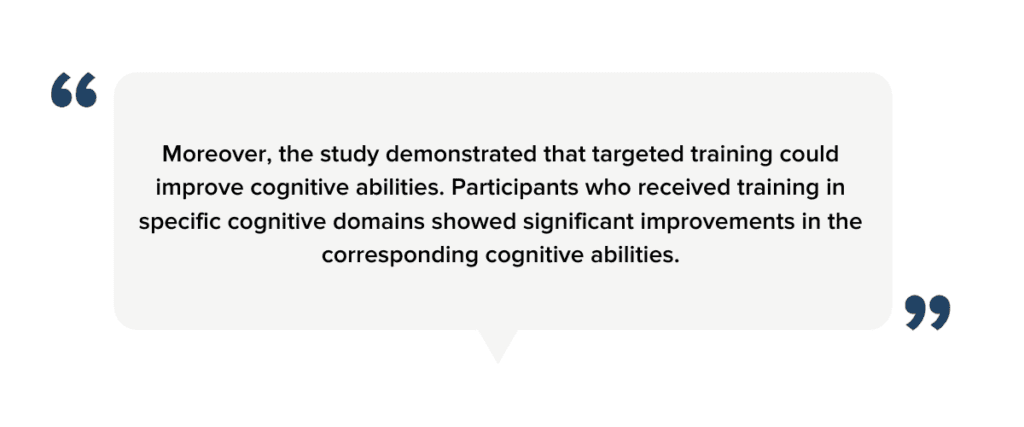We all know that jobs have a significant impact on our lives. For most of us, Mondays to Fridays are spent working and although this earns us money, it can also affect our physical and mental health, social lives and overall well-being. There is, interestingly, another benefit of working, though: your job can also shape your brain function.
Cognition is the process in which knowledge is acquired, including perception, intuition and reasoning. Cognitive ability — or general intelligence — therefore, is the mental processes we go through while awake.
Cognitive ability examples include basic abilities like attention, visual and special awareness, memory and language skills. These can become more complex executive functions, especially when working, and can include flexibility, decision making, problem solving, sequencing, anticipation and emotional self-regulation.
At Herrmann, we’re often asked about factors that may result in changing someone’s HBDI®. Major life events such as starting a new job, becoming a parent, relocating to a different city or country, or experiencing the loss of a close relationship can all have an impact on our cognitive preferences.
Previous research at how your career changes your brain was famously found for London cab drivers, but the same is found for other occupations like acupuncturists, musicians and even airport security officers, like the British Psychological Society highlights. More stimulating jobs can also bring cognitive benefits which carry on further into life. A recent study at Xin Zhao at Northwest Normal University in China has also found that careers that challenge the updating of information held in working memory aspect of cognitive functioning also improves our brains.
The study recruited 53 ticket collectors in Chinese restaurants and 53 security guards as a control group. Ticket collectors, who have a challenging job of remembering and managing orders, displayed better working memory updating ability compared to security guards. A second study involved training 33 student participants on a computer simulation of ticket collector tasks, resulting in improved working memory updating ability. These findings suggest that working as a ticket collector enhances this cognitive skill.
The research affirms previous studies, like that published in the Journal of Applied Psychology, that individuals who have more cognitively demanding jobs show stronger executive functions. Studies suggests that those in creative roles enhanced fluid intelligence and cognitive flexibility, individuals with less cognitively demanding jobs showed a decline in cognitive abilities.
So, what does this mean for you and your career? It means that the type of work you do can significantly impact your cognitive abilities over time.

Another study by researchers from the University of Cambridge found that an individual’s job can influence cognitive skills. The study analysed data from over 90,000 participants in the UK Biobank, examining the relationship between their occupation and cognitive performance in various domains, such as memory, attention and reasoning.
The findings showed that individuals who worked in mentally challenging jobs, especially ones that involved solving complex problems and managing tasks, performed well in tests measuring fluid intelligence. Fluid intelligence refers to the ability to reason and solve problems. On the other hand, individuals in jobs that required manual skills and physical labour demonstrated better performance in tests measuring crystallised intelligence, which is based on knowledge and experience.

Another benefit of a mentally challenging career is that it can have a positive effect on your brain age. A University of Edinburgh study reaffirmed previous studies that individuals engaging in mentally stimulating activities are less likely to show cognitive decline as they age.
Other ways to improve your cognitive abilities
- Exercise regularly: Daily walks, light resistance training or playing with your dog can improve blood flow, stimulate muscles and maintain motor skills for long term brain function and health.
- Stimulate your brain with games: Incorporate brain games, card games or board games into your routine to strengthen memory, pattern recognition and critical thinking skills.
- Maintain a healthy lifestyle: Eat whole foods, stay hydrated and prioritise sufficient sleep to benefit both your body and brain.
- Reduce stress: Employ stress-relieving techniques like meditation, stretching, listening to relaxing music or pursuing new hobbies to minimise the negative effects of stress on your body and mind.
- Embrace new experiences: Read new books, explore different hobbies and learn new skills to foster continuous growth and development. Lifelong learning positively impacts cognition.
Overall, the research reinforces the idea that our professional experiences and the tasks we perform at work can shape our cognitive abilities, contributing to changes in our HBDI® profiles.
To learn more about the Diversity of Thought and its impact on cognitive abilities, we invite you to download our comprehensive whitepaper.

